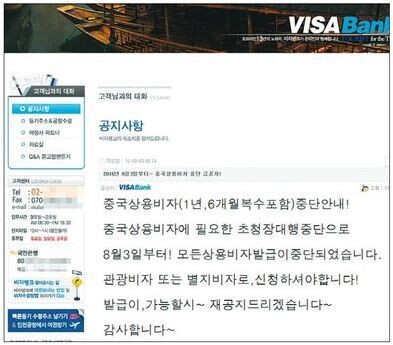hankyoreh
Links to other country sites 다른 나라 사이트 링크
[Editorial] China’s petty backlash over THAAD deployment

There are increasing signs that trouble is afoot for South Korea’s exports of cultural products, called the Korean Wave, or Hallyu, to China and for cooperation and exchange with the Chinese media.
If reports in the Chinese media and the analysis of industry insiders are correct when they say that this trouble is tied to South Korea’s decision to deploy the THAAD antimissile system in Seongju County, North Gyeongsang Province, this is petty behavior that is not appropriate for the current circumstances.
Several examples have already come to light. Some of the more striking ones are the delay of the shooting and screening of a video involving South Korean entertainers, the cancellation of a scheduled event for cooperation and exchange and the reduction of the activities of South Korean celebrities in China.
Reports are even suggesting that there will be a de facto moratorium on issuing new licenses for broadcasting South Korean dramas in China. Such nonsensical regulations are reportedly being orchestrated by China’s State Administration of Press, Publication, Radio, Film and Television, which is the final review board for Chinese broadcasters.
And yet the Chinese government has offered no official announcement about sanctions on South Korean cultural exports.
There is a possibility that low-level agencies and regional bureaucrats are acting on their own authority. Under the Chinese political system, such officials have no choice but to tread carefully around the central government.
Since this atmosphere is tied to the Chinese government’s wholesale denunciation of the THAAD deployment, it is unlikely to change.
The People’s Daily, China‘s top state-run newspaper, and the Global Times, its sister publication, are bashing THAAD day in and day out in their editorials and columns. Over the past few days, they have been paying more attention to THAAD than to the conflict in the South China Sea.
The THAAD conflict appears to be overshadowing the larger relationship between China and South Korea.
China’s concerns about the THAAD deployment are understandable in terms of how they “damage the strategic balance between the US and China,” to borrow a Chinese expression. Furthermore, there are numerous holes in the argument made by the government of South Korean President Park Geun-hye that THAAD needs to be deployed in Seongju County in order to defend the country from North Korea’s nuclear threat.
Even so, China is in the wrong if it has taken action to sanction the Korean Wave without offering any clear grounds for such action. The right path for China’s relations with South Korea is discussing security issues in the appropriate channels and remaining committed to cooperation and exchange in the economy and the private sector.
Cultural exchange, which is symbolized by the Korean Wave, serves as a touchstone that deepens the relations between the two countries. For public sentiment in the two countries to sour because cultural exchange is not working is not an outcome that China would want, either.
There are numerous shortcomings to the Park administration’s decision to deploy THAAD, including the dubious arguments about its efficacy, its negative impact on the security regime and the way that it was rushed through. Even now the South Korean government ought to take the whole plan back to the drawing board, but that does not justify China’s petty attempts to get back at South Korea for THAAD.
Please direct questions or comments to [english@hani.co.kr]

Editorial・opinion
![[Column] Has Korea, too, crossed the Rubicon on China? [Column] Has Korea, too, crossed the Rubicon on China?](https://flexible.img.hani.co.kr/flexible/normal/500/300/imgdb/original/2024/0419/9317135153409185.jpg) [Column] Has Korea, too, crossed the Rubicon on China?
[Column] Has Korea, too, crossed the Rubicon on China?![[Correspondent’s column] In Japan’s alliance with US, echoes of its past alliances with UK [Correspondent’s column] In Japan’s alliance with US, echoes of its past alliances with UK](https://flexible.img.hani.co.kr/flexible/normal/500/300/imgdb/original/2024/0419/2317135166563519.jpg) [Correspondent’s column] In Japan’s alliance with US, echoes of its past alliances with UK
[Correspondent’s column] In Japan’s alliance with US, echoes of its past alliances with UK- [Editorial] Does Yoon think the Korean public is wrong?
- [Editorial] As it bolsters its alliance with US, Japan must be accountable for past
- [Guest essay] Amending the Constitution is Yoon’s key to leaving office in public’s good graces
- [Editorial] 10 years on, lessons of Sewol tragedy must never be forgotten
- [Column] A death blow to Korea’s prosecutor politics
- [Correspondent’s column] The US and the end of Japanese pacifism
- [Guest essay] How Korea turned its trainee doctors into monsters
- [Guest essay] As someone who helped forge Seoul-Moscow ties, their status today troubles me
Most viewed articles
- 1[Column] The clock is ticking for Korea’s first lady
- 2Hong Se-hwa, voice for tolerance whose memoir of exile touched a chord, dies at 76
- 3After 2 months of delayed, denied medical care, Koreans worry worst may be yet to come
- 4[Column] Has Korea, too, crossed the Rubicon on China?
- 5[Correspondent’s column] In Japan’s alliance with US, echoes of its past alliances with UK
- 6US overtakes China as Korea’s top export market, prompting trade sanction jitters
- 7Samsung barricades office as unionized workers strike for better conditions
- 8All eyes on Xiaomi after it pulls off EV that Apple couldn’t
- 9More South Koreans, particularly the young, are leaving their religions
- 10John Linton, descendant of US missionaries and naturalized Korean citizen, to lead PPP’s reform effo